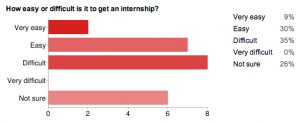“Internships are, in some ways, the new “entry-level” positions, especially when jobs are tough to come by.” – Tristan Hallman, 22
College students have relied on unpaid internships as sources of college credit, job experience and networking opportunities for at least a couple of decades. Increasingly, undergrads are facing rivalry from a new wave of applicants, dubbed “adult interns,” whose B.A.s and M.A.s have already gathered a significant amount of dust. In spite of the added competition, students and graduates alike still view interning as a valid way to broaden skill sets and make valuable contacts.
The question “How valuable are internships?” was posed to 23 participants. All are college graduates with the exception of two who are in their final semesters.
Participants cited that their primary reasons for seeking out internships are to gain experience in their fields of study, acquire specific skills and build out their resumes.
“Internships are the best way for me to build the confidence and experience I need to eventually find a full-time position,” says 22-year-old Irina Gorelik, a recent graduate. Gorelik majored in psychology at Hunter College and, having entered college immediately after high school, had no prior field-related experience.
Of those surveyed, 83 percent said they have interned at least once in the past. Surprisingly, the same number cited a lack of time as the main reason they would not apply for internships, whether or not they have interned in the past.
The legitimacy of interning duties is another concern for prospective applicants. Understandably, the coffee-fetching internship is not ideal for those who have already invested a small fortune in their education.
“I did not learn anything at [my internship]. All I did was busy work – opening mail, transcription, etc.,” says Brenna Walton, 30. “I have heard of internships where you are basically another member of the staff and that would obviously be the most valuable.”
Nearly half of the survey respondents also sometimes question or entirely discount the value of certain internships. Maria Gotay says she has interned on four occasions. While she has had largely positive experiences herself, she dislikes the practices of less savory employers.
“When the company wants an intern for the free labor, and it’s really an unfair situation for any adult to be in,” she says.
Only a third of participants said they received payment for their work. Less than a quarter said one or more of their internships directly resulted in a job.
It all seems to boil down to research and perseverance. The currently stale job market has made it difficult for everyone to build and make good use of their skills. More people than ever are accepting little or no pay in exchange for their work.
What do you think about this change? Is the internship the new entry-level job?
Also, if you are a perspective adult intern, ABC News has a guide to help you navigate the applicant scene.


